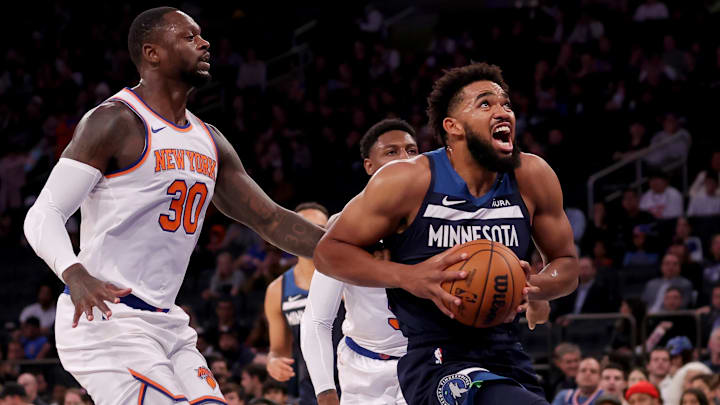The day none of us actually thought would ever come is here. The Karl-Anthony Towns era has officially ended for the Minnesota Timberwolves, with the team dealing him to the New York Knicks in a surprise blockbuster trade that was finalized on Friday night.
KAT will join the Knicks, while the Timberwolves will receive Julius Randle, Donte DiVincenzo and a first-round pick in return. All this goes down with less than a week remaining on the calendar before media day and training camp open up for both teams.
This leads us to wonder: why would these teams agree to this deal at such a late stage in the offseason? This trade was not exactly a game-breaking move for either team, though you can argue why each side won the deal. So why would either side be willing to make such a roster-altering and risky move this close to the season?
For the Timberwolves, the answer seems to lie in the financial restrictions outlined in the NBA's new collective bargaining agreement. Minnesota was already burdened by the penalties of the aprons within this new CBA, with matters set to only get worse with Towns' new contract extension kicking in.
The Timberwolves traded KAT due to new CBA restrictions
Now, the Wolves will have significantly less to worry about after exchanging KAT's four-year, $220 million contract for the two years and $59 million that Julius Randle has remaining on his current deal. Plenty of observers have already pointed out that the apron restrictions seemed to be Minnesota's primary motivation to get this done, which would explain a lot.
Timberwolves management knew that this team as currently constructed was unsustainable from a financial aspect. Yes, the roster was extremely talented and took the organization to its first Western Conference Finals in 20 years, but there was simply no way to make the money work without handicapping the front office.
This is simply what life will begin to look like in the NBA moving forward. Highly successful teams will be forced to part ways with very valuable players for the simple reason that they are not able to pay them without creating undesirable circumstances.
Minnesota was essentially the first victim of this phenomenon, with no other contenders swapping out one of their top stars in this manner under the new CBA yet. It is certainly unfortunate that finances are quite literally the only reason the Timberwolves are choosing to part ways with one of their most accomplished players in franchise history, but this is the unfortunate reality NBA fans will be forced to live in going forward.
